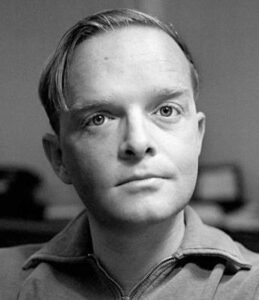Books By Truman Capote
- Other Voices, Other Rooms (1948) – standalone
- A Tree of Night and Other Stories (1949) – standalone
- The Grass Harp (1951) – standalone
- Breakfast at Tiffany’s (1958) – standalone
- In Cold Blood (1966) – standalone
- Music for Chameleons (1980) – standalone
About Truman Capote
 Truman Capote, born Truman Streckfus Persons on September 30, 1924, in New Orleans, Louisiana, was an American author, playwright, and literary icon known for his vivid storytelling and distinctive prose style. Capote rose to prominence in the mid-20th century as a leading figure in American literature, renowned for his groundbreaking works of fiction and nonfiction that explored the depths of human nature and the complexities of society.
Truman Capote, born Truman Streckfus Persons on September 30, 1924, in New Orleans, Louisiana, was an American author, playwright, and literary icon known for his vivid storytelling and distinctive prose style. Capote rose to prominence in the mid-20th century as a leading figure in American literature, renowned for his groundbreaking works of fiction and nonfiction that explored the depths of human nature and the complexities of society.
Capote’s literary career began in his early twenties when he published his first novel, “Other Voices, Other Rooms” (1948), which garnered critical acclaim for its lyrical prose and exploration of themes such as identity, sexuality, and isolation. He followed this success with a collection of short stories titled “A Tree of Night and Other Stories” (1949), further establishing his reputation as a masterful storyteller.
In 1951, Capote published “The Grass Harp,” a semi-autobiographical novel that delves into themes of friendship, family, and the human spirit. However, it was his novella “Breakfast at Tiffany’s” (1958) that catapulted him to international fame. The story of Holly Golightly, a free-spirited socialite living in New York City, captured the imagination of readers and inspired a beloved film adaptation starring Audrey Hepburn.
Capote’s most enduring work, “In Cold Blood” (1966), marked a departure from his earlier fiction and established him as a pioneer of the true crime genre. This groundbreaking nonfiction novel recounts the brutal murders of the Clutter family in rural Kansas and the subsequent investigation and trial of their killers. Through meticulous research and immersive storytelling, Capote created a gripping and haunting narrative that remains a landmark in American literature.
Throughout his career, Capote’s writing was characterized by its richly detailed prose, keen observation of human behavior, and sharp wit. He was known for his ability to blend fact and fiction, blurring the lines between reality and imagination to create compelling narratives that resonate with readers to this day.
Truman Capote’s literary legacy continues to inspire writers and readers alike, and his influence can be seen in the works of subsequent generations of authors. His unique voice and enduring contributions to literature ensure that he remains a revered figure in the annals of American letters.

